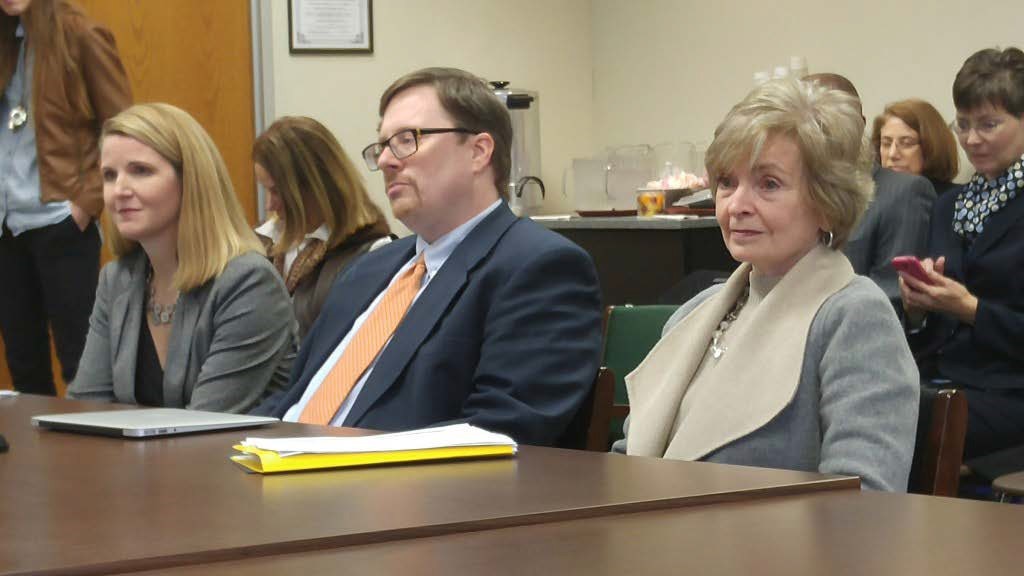Legislators Get Mixed Bag of Teacher PayProposals
Atkinson’s call for 10-percent hike draws cool reception
Legislators Get Mixed Bag of Teacher Pay Proposals – Carolina Journal
From left, Best NC’s Brenda Berg, the John Locke Foundation’s Terry Stoops, and state Superintendent June Atkinson prepare to discuss teacher compensation on Jan. 27 before a House committee. (CJ Photo by Barry Smith)
in CJExclusives
February 1, 2016
4:30PM
Before a state House committee last Wednesday, state Superintendent of Public Instruction June Atkinson recommended that all public school teachers in North Carolina get a 10 percent boost in their pay as part of a four-part plan to increase teacher compensation.
Several members of the House Select Committee on Education Strategy and Practices were skeptical of the value of across-the-board raises along with their cost. In a presentation later that day, Terry Stoops, director of research and education studies at the John Locke Foundation, said universal pay raises send the wrong signals to the best and worst classroom teachers. And in remarks the following day to the same panel, House Speaker Tim Moore, R-Cleveland, rejected the idea of a 10-percent raise.
Atkinson, who is running for re-election, likened the tiers of compensation to a four-layered wedding cake. The base level of the cake must be competitive enough to be attractive, Atkinson said.
“I would want North Carolina to be extremely bold and to look toward a 10 percent increase for all of our teachers,” Atkinson said.
The cost for providing all teachers 10 percent raises would be around
$540 million.
Rep. Jonathan Jordan, R-Ashe, asked Atkinson if spending the additional money would guarantee an end to the state’s teacher compensation problems.
Atkinson said that she wanted to provide the committee with cost figures. “I recognize that it is a big item,” Atkinson said. “As state superintendent you have in statute that it is my responsibility to let the needs of our schools be known. If I were in your shoes, I would be worrying about that money, too.”
Also presenting to the committee Wednesday were Stoops, Trip Stallings, director of policy research at the Friday Institute for Educational Innovation at N.C. State University, and Brenda Berg, president and CEO at Best NC.
Stoops said he didn’t like across-the-board raises because they encourage bad teachers to remain on the job.
“When you raise salaries across the board, both your best teachers and your worst teachers receive that salary, you are incentivizing the bad teachers to stay in the profession because they’re assuming that the across-the-board pay increase is what they will keep receiving, regardless of how they are performing,” Stoops said. “This creates a situation where we are essentially allowing those poor teachers to stay in the profession, and not really rewarding our most effective teachers.”
Stoops said having a performance-based pay or differentiated pay would allow the best teachers to receive the compensation they deserve.
Atkinson said the second layer of compensation requires identifying a certain percentage of teachers to be designated as teacher leaders, who would get additional pay for their roles. These teachers could be instructional coaches, peer evaluators, or grade level coordinators, among other things, she said.
A third layer would boost compensation to attract teachers to low performing schools. The fourth layer would provide bonuses for teachers at schools that exceed anticipated growth, Atkinson said.
Stallings said that differential pay is complex and cautioned against having a one-size-fits all approach to such salary boosts. He said that there is “very little evidence” of an impact on student performance when the focus is on pay-for-performance only.
“What works in Charlotte is probably not going to work in Bertie County,” Stallings said.
Stoops said that the purpose for having differential pay is teacher retention. He also said that teachers leave their job for various reasons, not just pay.
“It’s not just compensation,” Stoops said. “It’s personal circumstances. They don’t like their principal. They think the school district is too big. The working conditions are terrible. They don’t have the books that they need, or the labor market is somehow enticing them to move on to another field.”
Berg, from BEST NC, a nonprofit coalition of business leaders promoting improvements in public schools, said there a national crisis is brewing because millennials don’t want to go into the teaching profession.
“Compensation is a piece of the puzzle,” Berg said. But she suggested that there is a need to treat teachers more like professionals.
Berg offered some suggestions, such as providing scholarships or repaying student loans to teachers who get their degrees in North Carolina and agree to work hereafterward.
“We need to elevate our respect for teachers,” Berg said.
Rep. Paul “Skip” Stam, R-Wake, also suggested that the state no longer consider individual teachers’ salaries public records.
“I think that’s the main reason that so many of they say they don’t want a differentiated performance pay because of envy and jealousy,” Stam said. “They don’t want their friend down the hall to know that they’re making
$2,000 more than they are.” Even though Moore rejected Atkinson’s proposal for a 10-percent raise, Stoops said he expected this year’s short session of the General Assembly to enact a smaller across-the-board pay increase. “The amount of that pay raise will depend on the revenue outlook and the pressures from other budgetary areas,” Stoops said. “I would say 5 percent would be the ceiling.”
categories: Education (PreK-12), K-12 Education, Spending & Taxes
tags: ncga, teacher pay
Click here to view the Legislators Get Mixed Bag of Teacher Pay Proposals PDF


